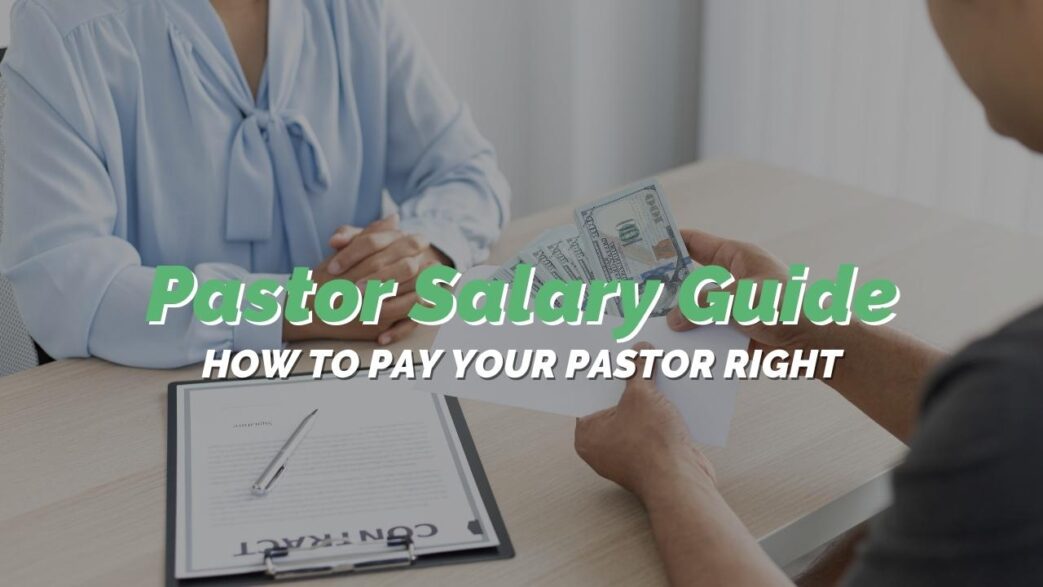Pastor salaries are always a hot topic in the church world, and there is no single answer to the question of how much you should pay a pastor. Every church is different, and the role of a pastor and ensuing responsibilities vary from church to church.
This blog will explore how to determine pastor salaries by church size and ministry role. In addition, we will look at why pastor salaries matter, cost of living, and tools to help you figure out how to set your pastor salaries.
Looking for more? We have a post that goes into even more depth about church compensation. The Ultimate Church Compensation And Salary Guide
Estimated reading time: 15 minutes
Table of contents
- Why Your Church’s Pastor Salary Matters
- How Does Your Church Define the Pastor Role?
- Factors for Determining Pastor Salary
- How Location Affects Cost of Living
- Tools to Help you Determine Standard Cost of Living Expenses
- Pastor Salaries by Ministry Role and Church Size
- Other Pastor Salary Considerations
- Can’t Afford a Full-Time Pastor Salary?
- Pastor Salary Guide
Why Your Church’s Pastor Salary Matters
Strong leadership is essential for every church. You cannot underestimate your pastors’ importance or downplay their impact. So, figuring out the right salaries for your pastors is crucial for building an excellent leadership team.
The right pastor’s salary and compensation package help to
- attract the right people
- ensure they earn enough to meet the cost of living and support their families
- reduces turnover among your staff
- fairly compensates someone for the workload and the responsibilities they carry
We have even argued that you should pay your pastors more.
Pastors often feel guilty talking about money. Some fear that asking for money is synonymous with greed and materialism, but as 1 Timothy 6:10 says, “the love of money is a root of all kinds of evil.” (emphasis added).
Nobody decides to work for a church because they think they’re going to get rich. Ministry is a lifestyle of calling and service. But expecting fair compensation is not greedy. On the contrary, Jesus said a worker is worthy of their wages (Luke 10:7).
Pastors serve a very important and demanding role. They are responsible for the spiritual health and growth of their congregations. Pastors provide guidance and support during difficult times. Also, they are the face of the church to the community.
And don’t forget: they often work long hours, including weekends.
For all of these reasons, it is important that churches take the time to thoughtfully consider what an appropriate salary would be for their pastors. Ultimately, an unhealthy pastor or high turnover among leadership will hurt the church and its members.
How Does Your Church Define the Pastor Role?

The number of pastors at a church will vary depending on the size of the congregation, the denomination, and the leadership structure. Knowing the different responsibilities for each pastor role is an essential first step to determining a fair and reasonable range for pastor salaries.
The amount and type of responsibilities a pastor has depend largely on the size of the church and its volunteer team. In a small church, the pastor may be responsible for everything from leading worship to cleaning the bathrooms. On the other hand, a large church may have multiple pastors with different roles and responsibilities.
Some churches may have pastors in the following roles
- Lead pastor/senior pastor: The primary preaching and teaching pastor who also provides leaders general oversight of the church.
- Associate pastor or executive pastor: A pastor charged with specific ministry responsibilities or oversight of church operations, leading staff, etc.
- Pastoral care: A pastor in an outreach or therapist-type role that provides support for members during difficult times. May also cover ministries such as small groups or discipleship.
- Worship pastor: responsible for planning and leading worship services.
- Youth pastor: provides leadership and direction for the youth ministry.
- Children’s pastor: provides leadership and direction for the children’s ministry.
You may have even more pastor roles in larger churches, such as a dedicated outreach/community pastor, missions pastor, small group pastor, or campus pastor.
It’s also worth noting that large churches typically have extensive facility, technology, finance, and operations needs that require an experienced director. Although the duties are not pastoral in nature, these directors carry a tremendous amount of responsibility and may be in the same pay tier as high-level pastors.
Factors for Determining Pastor Salary
Here are a few critical elements you’ll want to consider when it comes time to determine where a pastor fits on the salary pay range scale:
- Education and experience: How much education does your pastor have? Do they have relevant work experience?
- Church size: As we mentioned, the size of the church will play a role in the number of pastors and their responsibilities. Pastors at larger churches are typically paid more.
- Ministry responsibilities: What is the primary focus of the pastor’s ministry? Are they responsible for preaching, teaching, leading worship, or providing pastoral care? Do they manage other staff or volunteers?
- Location: The cost of living will vary from city to city and state to state. You’ll want to consider this when setting salaries.
- Work schedule: How many hours per week are they expected to work?
These are just a few of the factors you’ll want to consider when determining pastor’s salary. Of course, every church is different, so it’s important to tailor your process to fit the needs of your specific congregation. Also, remember that the IRS has guidelines for churches regarding employee compensation, so be sure to consult with a financial advisor or accountant to ensure you’re compliant.
How Location Affects Cost of Living

Cost of living is a factor for all employers when determining salaries, not just churches! One of the top factors is housing costs. However, additional living costs like groceries, transportation, utilities, and the price of healthcare are also factored in. In addition, the cost of living and housing market can vary within the same state, from urban to rural areas.
According to Forbes, the five most expensive states in the U.S. to live in 2022 are:
- Hawaii
- California
- Massachusetts
- New Jersey
- Connecticut
The five least expensive states in the U.S. to live in are:
- Mississippi
- Arkansas
- Alabama
- Oklahoma
- Ohio
National Average for Pastor Salary
The U.S. Bureau of Labor Statistics defines includes the roles of priest, minister, pastor, rabbi, bishop, curate, preacher, chaplain, rector, etc. under the category of “Clergy.”
The clergy job description includes conducting religious worship and performing functions associated with beliefs and practices of religious faith or denomination. It also includes providing spiritual and moral guidance to members.
Percentile wage estimates for clergy from the Bureau of Labor Statistics are:
- 10% – $14.64 hourly and $30,450 annual wage
- 25% – $18.66 hourly and $38,800 annual wage
- 50% (median) – $23.90 hourly and $49,720 annual wage
- 75% – $30.56 hourly and $63,560 annual wage
- 90% – $38.90 hourly and $80,920 annual wage
Tools to Help you Determine Standard Cost of Living Expenses
NerdWallet Cost of Living Calculator
NerdWallet has a tool that helps you compare the cost of living in two different cities or states. You can input your two locations and your current salary, and it will tell you how much you need to maintain your standard of living.
For example, if you type in a $50,000 salary and move from Colorado Springs, CO, to Birmingham, Alabama, you’ll need a household income of $42,616 because the cost of living is 15% lower in Alabama than in Colorado.
MIT Living Wage Calculator
The living wage calculator helps you determine the hourly rate for earning a living wage, poverty wage, and minimum wage for families based on the number of adults working and the number of children. This page also includes typical living expenses and annual expenses based on profession.
BestPlaces.net
Another great tool for determining the cost of living expenses can be found at BestPlaces.net. You can search for a specific location or compare two cities and see how much you need to live.
Pastor Salaries by Ministry Role and Church Size

If you’ve done some online research, you know how challenging it can be to find accurate data comparing salaries by church size, pastor role, and geographical location. When trying to put it all together, it feels like you’re comparing apples to bananas, mangoes, and blueberries. Below, we’ve put together some basic salary numbers for various pastor roles.
Average Pastor Salaries in 2022 in the United States
As a baseline, we’ve listed some average salary ranges below based on data from payscale.com, but remember, you need to take into account your church size and location when determining what to pay your pastor.
Senior Pastor
- Average base salary = $63,525
- Average salary range = $35k – $100k
Executive Pastor
- Average base salary = $68,139
- Average salary range = $42k – $96k
Worship Pastor
- Average base salary = $46,908
- Average salary range = $27k – $70k
Children’s Pastor
- Average base salary = $39,910
- Average salary range = $24k – $57k
Youth Pastor
- Average base salary = $39,757
- Average salary range = $26k – $55k
Donorbox has similar numbers in their calculations.

As you look at these numbers, you may wonder why the “Executive Pastor” role has a higher average base salary than a “Senior Pastor.” That’s likely because only larger churches would have room for an Executive Pastor role, and their senior pastors are paid on the higher end of the pay scale (or beyond).
Senior Pastors, on the other hand, would cover pastors from churches of all sizes across the country, including smaller churches and rural areas. The 2020 Faith Communities Today (FACT) study found that 65% of churches have fewer than 100 people in weekly attendance. These congregations often have just a senior pastor on payroll and, in some cases, may be part-time.
Other Pastor Salary Considerations
In addition to a salary, many pastors receive additional benefits, bonuses, and other forms of compensation. These can include:
- A housing allowance
- Paid vacation and holidays
- Health insurance
- Retirement benefits
- Life and disability insurance
- Social security and medicare offset
- Reimbursements
The pastor’s housing allowance can help cover the housing cost, including mortgage payments, property taxes, and repairs and maintenance. In some cases, the allowance may also be used to help offset the cost of renting a home or apartment. The housing allowance can be a valuable benefit for pastors, providing them with financial assistance while they serve their congregations.
We have an extensive resource on this subject you can check out here: Ultimate Guide to the Housing Allowance for Pastors.
In addition, most churches offer standard benefits such as health insurance, paid vacation and holidays, and retirement benefits, such as a 401(k) or 403(b) plan. These benefits can be extremely valuable to pastors and their families.
Finally, many pastors receive reimbursements for expenses related to their work. This can include travel expenses, conference registration fees, and the cost of books and other resources. Reimbursements can help offset some of the costs associated with being a pastor.
Balancing Financial Constraints with Fair Compensation

Let’s talk about that tricky balance between making sure pastors are fairly compensated and keeping the church’s finances in the green. It’s like juggling apples and oranges, but with money and people’s livelihoods. Tricky, right? But not impossible. Here’s how some churches are navigating this bumpy road.
You know, when the budget is tight, sometimes you’ve got to get creative. It’s like trying to whip up a gourmet meal with just a few basic ingredients. You start with the essentials, like making sure the pastor’s church salary is fair and square. Because let’s face it, fair pay is like the fuel that keeps the whole operation running smoothly. And those extra frills? Well, they might have to take a back seat for a bit. But don’t fret, there are ways around it.
Sharing the Load
One way to tackle the financial squeeze is by sharing the load. Yep, like how you’d divide up chores among roommates. Some churches manage their church salaries by opting for shared pastoral roles or even bringing in part-time help to lighten the burden on the budget. It’s a win-win, really. The pastors can focus on what they do best without the church feeling the pinch too hard.
Plus, let’s not forget about the unsung heroes — the volunteers. Those unpaid church staff folks can be real lifesavers. Think about how they can step in and lend a hand for tasks that don’t necessarily need a full-time pro. It’s all about making every penny count, right?
The Whole Package
But fair compensation isn’t just about the number on the paycheck. It’s about the whole package, the perks and benefits that can make a real difference. Imagine if the church could offer housing or help with those crazy housing costs in some areas.
That could be a game-changer for a pastor’s financial peace of mind. And why not throw in some gas money or transportation aid for all those trips to and from church-related gigs? It might not sound like much, but those little things can add up and make a world of difference.
Work Flexibility
Flexibility is another big player in this game. Can the pastor work from home sometimes, especially with the way things are moving these days? Giving them the option to skip the commute a couple of days a week can be a real mood lifter. Let’s face it, we all need a little breathing room, right?
The Big Picture
Now, here’s the big picture. It’s not just about making ends meet for the month; it’s about setting up the church for long-term stability. Think of it as investing in the future. When the congregation understands that fair compensation isn’t just a perk for the pastor but a solid investment in the church’s growth, it can shift the whole perspective. It’s like watering a plant. The more you take care of it, the more it flourishes. So, think smart, plan ahead, and keep those dollars working for everyone’s well-being.
Addressing Challenges and Overcoming Misconceptions

Here’s the scoop on tackling the hurdles and misconceptions that can trip us up when it comes to fair pastor compensation. It’s like a game of whack-a-mole sometimes — you solve one problem, and another one pops right up. But fear not, we’ve got some strategies up our sleeves that can help smooth things over. Let’s dive in.
Disparities in Expectations
When it comes to average pastor salary, expectations can be all over the map. Some might think they should be living like royalty, while others believe they should be content with mere breadcrumbs. Here’s the deal: communication is key. It’s crucial to have those honest conversations with the congregation about the ins and outs of fair compensation.
Let them peek behind the curtain, understand the complexities of the job, and why fair pay isn’t just about the money. It’s about valuing the dedication and hard work of these spiritual leaders. Building that mutual understanding can go a long way in smoothing out those bumps in the road.
The Money Talk Taboo
Let’s be real, talking about money can make even the boldest among us break out in a sweat. But avoiding the topic altogether? Well, that’s a recipe for disaster. Churches need to foster an environment where conversations about fair compensation are not just welcomed but encouraged. It’s about creating a culture of transparency and openness.
When the congregation sees that the church leadership isn’t shying away from the topic, it sets the stage for healthy and constructive discussions. No more tiptoeing around the elephant in the room. It’s time to bring it out into the open and address it head-on.
Educating on Equitable Compensation
Ah, misconceptions. They’re like those pesky weeds in the garden that just keep coming back. But we’ve got the tools to tackle them. Educating the congregation about the intricacies of a fair pastor’s salary is crucial. It’s not just about the Sunday sermons or the occasional counseling session. It’s about the countless hours spent in study, prayer, and guidance.
When the congregation understands the full scope of the pastor’s responsibilities, it shifts the narrative. It’s not just about what the pastor receives; it’s about investing in the growth and well-being of the whole community. So, let’s roll up our sleeves and get to work on weeding out those misconceptions for good.
Addressing Challenges
In a nutshell, addressing the challenges and misconceptions around fair compensation is about building bridges and fostering understanding. It’s about open communication, transparency, and education. When everyone’s on the same page, working towards the same goal, that’s when the real magic happens. So, let’s keep those conversations going and pave the way for a brighter, fairer future for all.
Can’t Afford a Full-Time Pastor Salary?
Paying a full-time pastor salary plus benefits can be prohibitive for small churches and start-up ministries. And in addition to a senior pastor, it may be impossible to hire additional pastors for specific ministries, worship, etc. In these cases, it may be necessary to consider hiring a part-time or bi-vocational pastor.
A bivocational pastor is typically someone who works another job in addition to their ministry role. This could be anything from working in retail to being a full-time business owner. In many cases, bivocational pastors are self-employed or work in jobs that offer flexible schedules.
The benefit of hiring a bivocational pastor is that they can often serve your church and be compensated for their time and effort. The downside is that they will have to divide their time and attention between their job and their ministry, which can sometimes be difficult.
Pastor Salary Guide

When it comes to setting pastor salaries, there are a number of factors to consider. The size of the church and the specific ministry role are two of the most important factors. Other considerations include benefits, bonuses, and other forms of compensation.
You also must ensure you’re in line with the cost of living for your specific area. Use the tools in this post, research, and ensure you’re paying your pastors fairly.
Do you have additional questions about figuring out your pastor’s salary? Let us know in the comments below!





Comments 6
This was very informative information. I believe that since double honor is due the pastors should at least get paid double the compensation based on what is determined by the cost of living and other compensation amounts..
In the private sector, discussing compensation with an employee can be stressful. I think that it is much more stressful for the board to discuss it with their pastor.
As a donor, I do have a problem with the head of a ministry receiving $1 million a year and having wealth over $10 million. I could go on about ministers on TV and etc.
At the other end, the Catholic church do not compensate their pastors(they do receive free room and board). As I say, compensation is a difficult subject.
Author
Well said. There are a lot of dynamics between boards/elders/councils, and pastors that make the conversation tricky!
Great information. Thank you so much!
i love you
Author
Haha! Glad we could help!